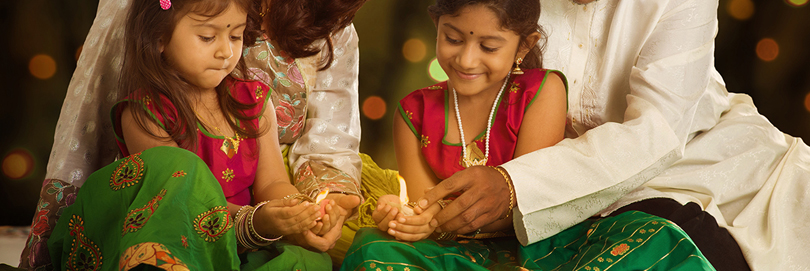Diwali Traditions & Customs

Deepavali, the literal meaning of which in Sanskrit is 'a row of lamps.' Filling little clay lamps with oil and wick and lighting them in rows all over the house is a tradition that is popular in most regions of the country. Even today in this modern world it projects the rich and glorious past of our country and teaches us to uphold the true values of life. It is associated with many customs and traditions. One of the most curious customs, which characterizes this festival of Diwali, is the indulgence of gambling, especially on a large scale in North India.
The first day of five day long Diwali celebrations is of great importance to the rich community of western India. Houses and business premises are renovated and decorated. Entrances are made colorful with lovely traditional motifs of Rangoli designs to welcome Lakshmi, the Goddess of wealth and prosperity. To indicate her long-awaited arrival, small footprints are drawn with rice flour and vermilion powder all over the houses. Lamps are kept burning all through the night. Believing this day to be auspicious women purchase some gold or silver or at least one or two new utensils.
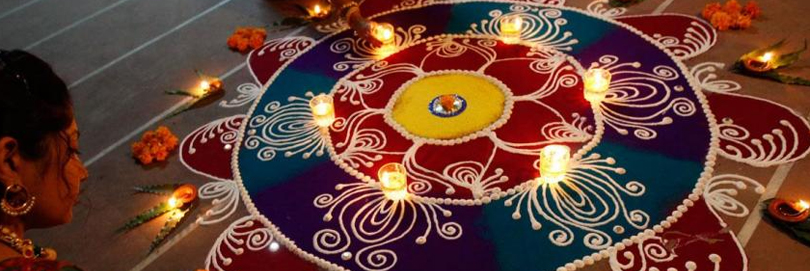
Lakshmi-Puja is performed in the evenings when tiny diyas of clay are lighted to drive away the shadows of evil spirits, devotional songs- in praise of Goddess Laxmi are sung and Naivedya of traditional sweets is offered to the Goddess. There is a peculiar custom in Maharashtra to lightly pound dry coriander seeds with jaggery and offer as Naivedya In villages cattle are adorned and worshiped by farmers as they form the main source of their income. In south cows are offered special veneration as they are supposed to be the incarnation of Goddess Lakshmi and therefore they are adorned and worshiped on this day.
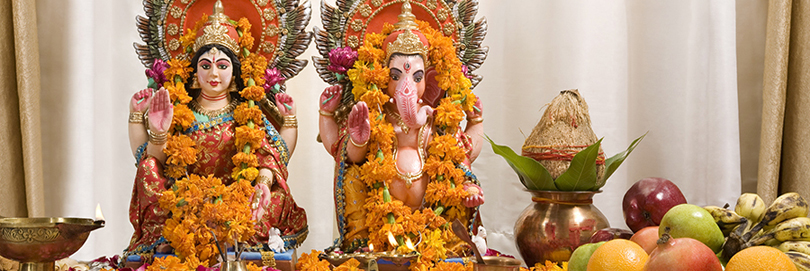
On second day there is a traditional practice specially in Maharashtra of taking bath before sunrise with oil and "Uptan" (paste) of gram flour and fragrant powders. In northern India, especially in places like Punjab, Diwali is dedicated to the worship of Lord Rama. While in Bengal, Kali/Durga, the goddess of strength, is worshiped. Diwali is one of the few Hindu festivals, which is celebrated in every part of the country, even in states like Kerala that has Onam as its main festival. To the Jains, Deepavali has an added significance to the great event of Mahaveera attaining the Eternal Bliss of Nirvaana.
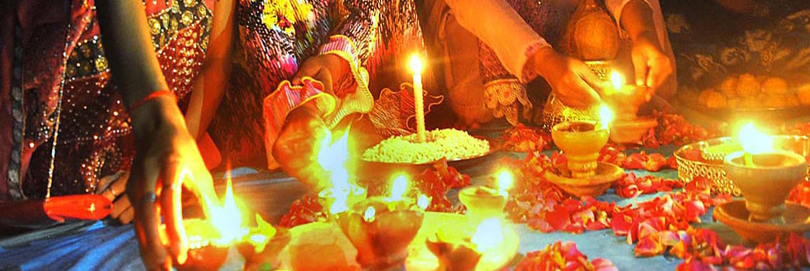
Govardhan-Puja is also performed in the North on the fourth day. This day is also observed as Annakoot meaning 'mountain of food'. In temples especially in Mathura and Nathadwara, the deities are given milk bath and dressed in shining attires with ornaments of dazzling diamonds, pearls, rubies and other precious stones. After the prayers and traditional worship innumerable varieties of delicious sweets are offered to the deities as "Bhog" and then the devotees approach and take Prasad.
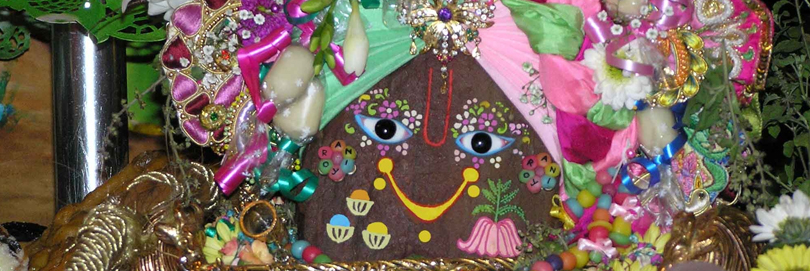
Goddess Lakshmi is worshiped in every Hindu household. In many Hindu homes it is a custom for the wife to put the red tilak on the forehead of her husband, garland him and do his "Aarti" with a prayer for his long life. In appreciation of all the tender care that the wife showers on him, the husband gives her a costly gift. This Gudi Padwa is symbolic of love and devotion between the wife and husband. On this day newly married daughters with their husbands are invited for special meals and given presents. Diwali celebration is a very happy occasion for all.
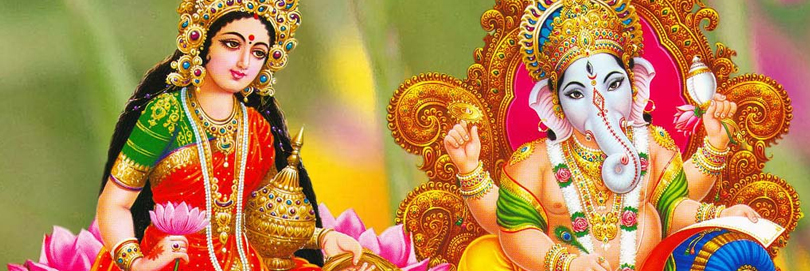
- - Diwali Cards
- - Crackers
- - Dry Fruits
Festival Fun
- Diwali Rangoli
- Diwali Whatsapp Messages/Status
- Diwali Recipes
- Deep in Diwali
- Tradition of Playing Cards
- Pooja Thali Decorations
- Making Diwali Cards
- Diwali Essay
- Diwali Poems
- Diwali Songs
- Diwali Mela
- Diwali Wallpapers
- Diwali Decorative Items
- Diwali 2024
- Diwali Messages
- Diwali Quotes
- Lakshmi Pooja
- Articles
- Lakshmi Ganesha Mantras
- Lakshmi Chalisa
- Diwali SMS
- Diwali Solar Eclipse
- Diwali Remedies
- 108 Lakshmi Names
Diwali Rangoli
Indians love colors and its perfectly reflected in various ways. Rangoli is one such example that is a unique art work that is...Know More
Diwali in History
The history of Diwali is replete with legends and these legends are moored to the stories of Hindu religious scriptures...Know More
Diwali Messages
Enjoy the Best and the Most Heartfelt Diwali Messages from all entries received by us!!...Know More
Diwali Gift Ideas
Diwali is the epiphany of showing gratefulness to the almighty for blessing with wealth and wisdom. It is the time of illuminating...Know More


